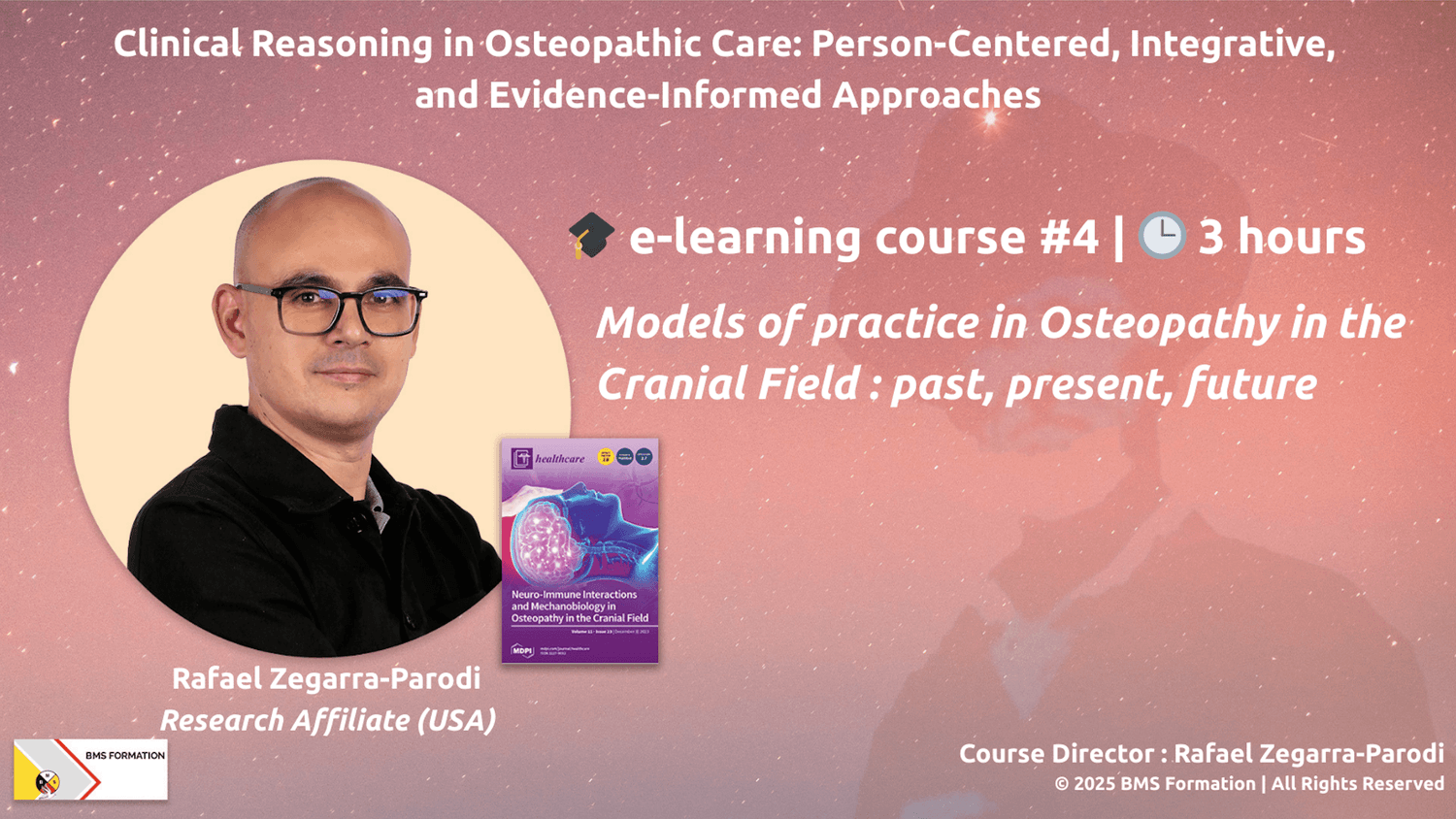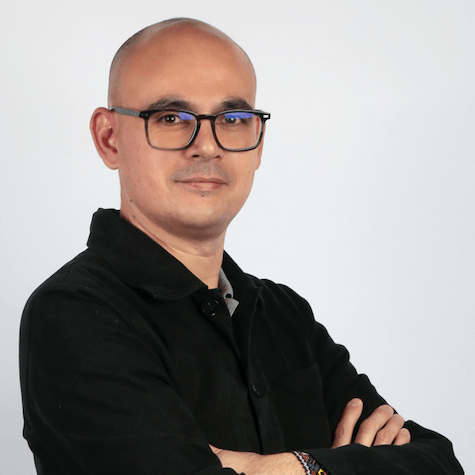We welcome you to the program « Clinical Reasoning in Osteopathic Care: Person-Centered, Integrative, and Evidence-Informed Approaches », a unique CPD course that combines the principles of osteopathy with advances in neuroscience and medical anthropology to strengthen clinical decision-making.
Course #04 | Models of Practice in Osteopathy in the Cranial Field: Past, Present, Future | 3 hours

Evidence-informed, person-centered, and culturally sensitive approaches?
· The Body-Mind-Spirit osteopathic tenet has been reintroduced to guide patient care in the latest update of osteopathic principles in the United States (Rogers et al., 2002). However, it requires a better definition for optimal use that can align with the values and expectations of patients within a person-centered Evidence-Based Practice (EBP) approach. Discover our exclusive series of three online courses, "Past-Present-Future", designed to enhance your osteopathic practice. This program highlights how this fundamental tenet supports person-centered, culturally sensitive EBP approaches.
· Our program is designed for professionals seeking to promote patient-centered, culturally sensitive, and evidence-based clinical approaches. We introduce the Cynefin framework to address the diversity and complexity of osteopathic techniques, optimizing their application across various clinical contexts.
· This additional course explores four key areas to enhance your professional practice in Osteopathy in the Cranial Field (OCF):
1. Historical exploration of the OCF model: an in-depth look at the origins of OCF as developed by Dr. William Garner Sutherland, DO, featuring a podcast with Jane Stark, DO, the author of Sutherland’s biography.
2. Synthesis of body-centered approaches in OCF: a comprehensive review of theories and current data on the neurophysiological effects of cranial techniques, as summarized in a recent review by Barsotti et al. (2023). This section also includes a podcast with Dr. Luís Palomeque del Cerro, a physiotherapist and osteopath.
3. Synthesis of person-centered and culturally sensitive approaches in OCF: this section integrates theories on cultural competence in healthcare, drawing on medical anthropology concepts such as the distinction between "illness" and "disease", and the impact of interoceptive manual approaches on multisensory body integration within traditional/Indigenous conceptual frameworks (Zegarra-Parodi et al., 2022).
4. Practical and research tools: includes valuable questionnaires for both clinical practice and research in osteopathic care, such as qualitative tools that capture the experience of practitioners applying cranial techniques (Aubin et al., 2014) and the lived experience of patients receiving these treatments (Vaughan et al., 2019).
· This course will help you refine your clinical reasoning and master the specific professional skills in OCF valued by your patients!
🎓 Rafael Zegarra-Parodi, MEd, DO (UK) | A.T. Still Research Institute, Kirksville, MO (USA) research affiliate | Course director
First author of six peer-reviewed publications exploring the evidence-informed clinical application of contemporary osteopathic principles (Rogers et al., 2002).
Each of our 4 evidence-informed online courses in our program can be taken independently. These courses are based on oral presentations delivered during a unique CPD event at "Le Grand Rex" in Paris in May 2022.

Learning objectives
Upon completing our program titled "Clinical Reasoning in Osteopathic Care: Person-Centered, Integrative, and Evidence-Informed Approaches", you will have the skills and knowledge to:
🎯 Critically appreciate the historical context of osteopathy's beginnings, which combined an integrative approach blending Western socio-cultural health belief systems with traditional/complementary and integrative medicines (interactions between A.T. Still and Native Americans).
🎯 Understand the importance of contextual factors in osteopathic care and their diversity based on patients' sociocultural health belief systems and associated body representations in health and disease.
🎯 Recognize the relevance of current neuroscientific models involved in patients' body awareness (multisensory integration: interoception, proprioception, and exteroception) and their clinical application in selecting interoceptive manual techniques (cranial, visceral, and myofascial osteopathic techniques).
🎯 Promote a person-centered, culturally sensitive, and evidence-informed clinical approach using the Cynefin conceptual framework.
🎓 Founded in France in 2019, BMS Formation is certified to the national Qualiopi standard, ensuring our continuing professional development (CPD) programs meet rigorous French quality requirements and international expectations.
📚 Our CPD courses are directly based on more than 10 peer-reviewed publications produced by our own international and interdisciplinary team.
👐 Designed by experienced clinicians for practicing clinicians, our courses focus on practical, evidence-informed osteopathic care.
💬 Get the opportunity to inform your practice with current evidence and engage discussions with the BMS Team and other participants!
Rafael Zegarra-Parodi is an internationally recognized osteopath, researcher, and educator. With over 25 years of clinical experience, he has published more than 35 peer-reviewed articles and has served as an Associate Editor of the International Journal of Osteopathic Medicine for a decade. He was a full-time Research Assistant Professor at the A.T. Still Research Institute in Kirksville, Missouri (USA) from 2012 to 2014 and has remained affiliated since, contributing as a member of the Executive Committee of DO-Touch.NET. As the co-founder and Course Director of BMS Formation, established in France, he leads a unique continuing education program that integrates person-centered care, scientific evidence, and cross-cultural insights into osteopathic practice.
For osteopaths registered with the General Osteopathic Council (UK), this set of three online courses, titled « Past-Present-Future », complies with the CPD activities covering the four themes of the Osteopathic Practice Standards, and more particularly the following themes: A. Communication and patient partnership (A1, A2, A6, A7), B. Knowledge, skills and performance (B4), C. Safety and quality in practice (C1, C2, C6), D. Professionalism (D2, D3, D6).
Made with Love by BMS Formation | All Rights Reserved | Copyright 2025





